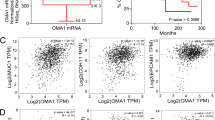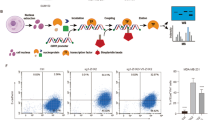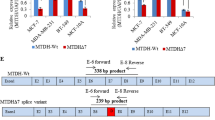Abstract
Metastatic breast tumors undergo epithelial-to-mesenchymal transition (EMT), which renders them resistant to therapies targeted to the primary cancers. The mechanistic link between mtDNA (mitochondrial DNA) reduction, often seen in breast cancer patients, and EMT is unknown. We demonstrate that reducing mtDNA content in human mammary epithelial cells (hMECs) activates Calcineurin (Cn)-dependent mitochondrial retrograde signaling pathway, which induces EMT-like reprogramming to fibroblastic morphology, loss of cell polarity, contact inhibition and acquired migratory and invasive phenotype. Notably, mtDNA reduction generates breast cancer stem cells. In addition to retrograde signaling markers, there is an induction of mesenchymal genes but loss of epithelial markers in these cells. The changes are reversed by either restoring the mtDNA content or knockdown of CnAα mRNA, indicating the causal role of retrograde signaling in EMT. Our results point to a new therapeutic strategy for metastatic breast cancers targeted to the mitochondrial retrograde signaling pathway for abrogating EMT and attenuating cancer stem cells, which evade conventional therapies. We report a novel regulatory mechanism by which low mtDNA content generates EMT and cancer stem cells in hMECs.
This is a preview of subscription content, access via your institution
Access options
Subscribe to this journal
Receive 50 print issues and online access
$259.00 per year
only $5.18 per issue
Buy this article
- Purchase on Springer Link
- Instant access to full article PDF
Prices may be subject to local taxes which are calculated during checkout








Similar content being viewed by others
Abbreviations
- mtDNA:
-
mitochondrial DNA
- EMT:
-
epithelial-to-mesenchymal transition
- EtBr:
-
ethidium bromide
- Cn:
-
calcineurin
- ESRP1:
-
epithelial splicing regulatory protein 1
- TFAM:
-
mitochondrial transcription factor A.
References
Attardi G, Schatz G . Biogenesis of mitochondria. Annu Rev Cell Biol 1988; 4: 289–333.
Ryan MT, Hoogenraad NJ . Mitochondrial-nuclear communications. Annu Rev Biochem 2007; 76: 701–722.
Greaves LC, Reeve AK, Taylor RW, Turnbull DM . Mitochondrial DNA and disease. J Pathol 2012; 226: 274–286.
Kujoth GC, Hiona A, Pugh TD, Someya S, Panzer K, Wohlgemuth SE et al. Mitochondrial DNA mutations, oxidative stress, and apoptosis in mammalian aging. Science 2005; 309: 481–484.
Amuthan G, Biswas G, Ananadatheerthavarada HK, Vijayasarathy C, Shephard HM, Avadhani NG . Mitochondrial stress-induced calcium signaling, phenotypic changes and invasive behavior in human lung carcinoma A549 cells. Oncogene 2002; 21: 7839–7849.
Biswas G, Adebanjo OA, Freedman BD, Anandatheerthavarada HK, Vijayasarathy C, Zaidi M et al. Retrograde Ca2+ signaling in C2C12 skeletal myocytes in response to mitochondrial genetic and metabolic stress: a novel mode of inter-organelle crosstalk. EMBO J 1999; 18: 522–533.
Wallace DC . Mitochondria and cancer. Nat Rev Cancer 2012; 12: 685–698.
Coller HA, Khrapko K, Bodyak ND, Nekhaeva E, Herrero-Jimenez P, Thilly WG . High frequency of homoplasmic mitochondrial DNA mutations in human tumors can be explained without selection. Nat Genet 2001; 28: 147–150.
Ishikawa K, Takenaga K, Akimoto M, Koshikawa N, Yamaguchi A, Imanishi H et al. ROS-generating mitochondrial DNA mutations can regulate tumor cell metastasis. Science 2008; 320: 661–664.
Lee HC, Yin PH, Lin JC, Wu CC, Chen CY, Wu CW et al. Mitochondrial genome instability and mtDNA depletion in human cancers. Ann N Y Acad Sci 2005; 1042: 109–122.
Fan W, Lin CS, Potluri P, Procaccio V, Wallace DC . mtDNA lineage analysis of mouse L-cell lines reveals the accumulation of multiple mtDNA mutants and intermolecular recombination. Genes Dev 2012; 26: 384–394.
Petros JA, Baumann AK, Ruiz-Pesini E, Amin MB, Sun CQ, Hall J et al. mtDNA mutations increase tumorigenicity in prostate cancer. Proc Natl Acad Sci USA 2005; 102: 719–724.
Shidara Y, Yamagata K, Kanamori T, Nakano K, Kwong JQ, Manfredi G et al. Positive contribution of pathogenic mutations in the mitochondrial genome to the promotion of cancer by prevention from apoptosis. Cancer Res 2005; 65: 1655–1663.
Correia RL, Oba-Shinjo SM, Uno M, Huang N, Marie SK . Mitochondrial DNA depletion and its correlation with TFAM, TFB1M, TFB2M and POLG in human diffusely infiltrating astrocytomas. Mitochondrion 2011; 11: 48–53.
Horton TM, Petros JA, Heddi A, Shoffner J, Kaufman AE, Graham SD Jr et al. Novel mitochondrial DNA deletion found in a renal cell carcinoma. Genes Chromosomes Cancer 1996; 15: 95–101.
Tseng LM, Yin PH, Chi CW, Hsu CY, Wu CW, Lee LM et al. Mitochondrial DNA mutations and mitochondrial DNA depletion in breast cancer. Genes Chromosomes Cancer 2006; 45: 629–638.
Guo J, Zheng L, Liu W, Wang X, Wang Z, Wang Z et al. Frequent truncating mutation of TFAM induces mitochondrial DNA depletion and apoptotic resistance in microsatellite-unstable colorectal cancer. Cancer Res 2011; 71: 2978–2987.
Moro L, Arbini AA, Yao JL, di Sant'Agnese PA, Marra E, Greco M . Mitochondrial DNA depletion in prostate epithelial cells promotes anoikis resistance and invasion through activation of PI3K/Akt2. Cell Death Differ 2009; 16: 571–583.
Woo DK, Green PD, Santos JH, D'Souza AD, Walther Z, Martin WD et al. Mitochondrial genome instability and ROS enhance intestinal tumorigenesis in APC(Min/+) mice. Am J Pathol 2012; 180: 24–31.
Polyak K, Weinberg RA . Transitions between epithelial and mesenchymal states: acquisition of malignant and stem cell traits. Nat Rev Cancer 2009; 9: 265–273.
Thiery JP, Acloque H, Huang RY, Nieto MA . Epithelial-mesenchymal transitions in development and disease. Cell 2009; 139: 871–890.
Schonberg MA, Marcantonio ER, Li D, Silliman RA, Ngo L, McCarthy EP . Breast cancer among the oldest old: tumor characteristics, treatment choices, and survival. J Clin Oncol 2010; 28: 2038–2045.
Imanishi H, Hattori K, Wada R, Ishikawa K, Fukuda S, Takenaga K et al. Mitochondrial DNA mutations regulate metastasis of human breast cancer cells. PLoS One 2011; 6: e23401.
Horwitz HB, Holt CE . Specific inhibition by ethidium bromide of mitochondrial DNA synthesis in physarum polycephalum. J Cell Biol 1971; 49: 546–553.
King MP, Attardi G . Human cells lacking mtDNA: repopulation with exogenous mitochondria by complementation. Science 1989; 246: 500–503.
Debnath J, Muthuswamy SK, Brugge JS . Morphogenesis and oncogenesis of MCF-10A mammary epithelial acini grown in three-dimensional basement membrane cultures. Methods 2003; 30: 256–268.
Lee GY, Kenny PA, Lee EH, Bissell MJ . Three-dimensional culture models of normal and malignant breast epithelial cells. Nat Methods 2007; 4: 359–365.
Mani SA, Guo W, Liao MJ, Eaton EN, Ayyanan A, Zhou AY et al. The epithelial-mesenchymal transition generates cells with properties of stem cells. Cell 2008; 133: 704–715.
Bae SN, Arand G, Azzam H, Pavasant P, Torri J, Frandsen TL et al. Molecular and cellular analysis of basement membrane invasion by human breast cancer cells in Matrigel-based in vitro assays. Breast Cancer Res Treat 1993; 24: 241–255.
Gumireddy K, Sun F, Klein-Szanto AJ, Gibbins JM, Gimotty PA, Saunders AJ et al. In vivo selection for metastasis promoting genes in the mouse. Proc Natl Acad Sci USA 2007; 104: 6696–6701.
Mendoza A, Hong SH, Osborne T, Khan MA, Campbell K, Briggs J et al. Modeling metastasis biology and therapy in real time in the mouse lung. J Clin Invest 2010; 120: 2979–2988.
Guha M, Srinivasan S, Biswas G, Avadhani NG . Activation of a novel calcineurin-mediated insulin-like growth factor-1 receptor pathway, altered metabolism, and tumor cell invasion in cells subjected to mitochondrial respiratory stress. J Biol Chem 2007; 282: 14536–14546.
Guha M, Pan H, Fang JK, Avadhani NG . Heterogeneous nuclear ribonucleoprotein A2 is a common transcriptional coactivator in the nuclear transcription response to mitochondrial respiratory stress. Mol Biol Cell 2009; 20: 4107–4119.
Butow RA, Avadhani NG . Mitochondrial signaling: the retrograde response. Mol Cell 2004; 14: 1–15.
Guha M, Fang JK, Monks R, Birnbaum MJ, Avadhani NG . Activation of Akt is essential for the propagation of mitochondrial respiratory stress signaling and activation of the transcriptional coactivator heterogeneous ribonucleoprotein A2. Mol Biol Cell 2010; 21: 3578–3589.
Larue L, Bellacosa A . Epithelial-mesenchymal transition in development and cancer: role of phosphatidylinositol 3′ kinase/AKT pathways. Oncogene 2005; 24: 7443–7454.
Shapiro IM, Cheng AW, Flytzanis NC, Balsamo M, Condeelis JS, Oktay MH et al. An EMT-driven alternative splicing program occurs in human breast cancer and modulates cellular phenotype. PLoS Genet 2011; 7: e1002218.
Warzecha CC, Sato TK, Nabet B, Hogenesch JB, Carstens RP . ESRP1 and ESRP2 are epithelial cell-type-specific regulators of FGFR2 splicing. Mol Cell 2009; 33: 591–601.
Warzecha CC, Jiang P, Amirikian K, Dittmar KA, Lu H, Shen S et al. An ESRP-regulated splicing programme is abrogated during the epithelial-mesenchymal transition. EMBO J 2010; 29: 3286–3300.
Warzecha CC, Shen S, Xing Y, Carstens RP . The epithelial splicing factors ESRP1 and ESRP2 positively and negatively regulate diverse types of alternative splicing events. RNA Biol 2009; 6: 546–562.
Campbell CT, Kolesar JE, Kaufman BA . Mitochondrial transcription factor A regulates mitochondrial transcription initiation, DNA packaging, and genome copy number. Biochim Biophys Acta 2012; 1819: 921–929.
Sarzi E, Goffart S, Serre V, Chretien D, Slama A, Munnich A et al. Twinkle helicase (PEO1) gene mutation causes mitochondrial DNA depletion. Ann Neurol 2007; 62: 579–587.
Biswas G, Anandatheerthavarada HK, Avadhani NG . Mechanism of mitochondrial stress-induced resistance to apoptosis in mitochondrial DNA-depleted C2C12 myocytes. Cell Death Differ 2005; 12: 266–278.
Guha M, Tang W, Sondheimer N, Avadhani NG . Role of calcineurin, hnRNPA2 and Akt in mitochondrial respiratory stress-mediated transcription activation of nuclear gene targets. Biochim Biophys Acta 2010; 1797: 1055–1065.
Kulawiec M, Safina A, Desouki MM, Still I, Matsui S, Bakin A et al. Tumorigenic transformation of human breast epithelial cells induced by mitochondrial DNA depletion. Cancer Biol Ther 2008; 7: 1732–1743.
Magda D, Lecane P, Prescott J, Thiemann P, Ma X, Dranchak PK et al. mtDNA depletion confers specific gene expression profiles in human cells grown in culture and in xenograft. BMC Genomics 2008; 9: 521.
Naito A, Cook CC, Mizumachi T, Wang M, Xie CH, Evans TT et al. Progressive tumor features accompany epithelial-mesenchymal transition induced in mitochondrial DNA-depleted cells. Cancer Sci 2008; 99: 1584–1588.
Tang W, Chowdhury AR, Guha M, Huang L, Van WT, Rustgi AK et al. Silencing of IkBbeta mRNA causes disruption of mitochondrial retrograde signaling and suppression of tumor growth in vivo. Carcinogenesis 2012; 33: 1762–1768.
Yu M, Zhou Y, Shi Y, Ning L, Yang Y, Wei X et al. Reduced mitochondrial DNA copy number is correlated with tumor progression and prognosis in Chinese breast cancer patients. IUBMB Life 2007; 59: 450–457.
Moreno-Bueno G, Portillo F, Cano A . Transcriptional regulation of cell polarity in EMT and cancer. Oncogene 2008; 27: 6958–6969.
Blaustein M, Pelisch F, Tanos T, Munoz MJ, Wengier D, Quadrana L et al. Concerted regulation of nuclear and cytoplasmic activities of SR proteins by AKT. Nat Struct Mol Biol 2005; 12: 1037–1044.
Xia P, An HX, Dang CX, Radpour R, Kohler C, Fokas E et al. Decreased mitochondrial DNA content in blood samples of patients with stage I breast cancer. BMC Cancer 2009; 9: 454.
Yu M, Shi Y, Wei X, Yang Y, Zang F, Niu R . Mitochondrial DNA depletion promotes impaired oxidative status and adaptive resistance to apoptosis in T47D breast cancer cells. Eur J Cancer Prev 2009; 18: 445–457.
Fillmore CM, Kuperwasser C . Human breast cancer cell lines contain stem-like cells that self-renew, give rise to phenotypically diverse progeny and survive chemotherapy. Breast Cancer Res 2008; 10: R25.
Acknowledgements
This research was supported by NIH grant CA-22762 and an Endowment from the Harriet Ellison Woodward Trust to NGA. We thank Benjamin Cieply (Carstens laboratory) for providing reagents for the ESRP1 experiments; Drs Brett Kaufman and Jill Kolesar (Kaufman lab) for providing TFAM shRNA constructs; Dr Joseph Baur for the GFP shRNA plasmid; Dr Mauricio Reginato and members of his laboratory for sharing protocols and reagents for immunostaining of the MCF10A 3D spheres; and Drs Christopher Lengner and Qihong Huang for valuable comments on the manuscript. We thank Dr Leslie King for critical comments and editorial help.
Author contributions
MG and NGA designed research and wrote the paper; MG, SS and AK performed the research; GR assisted with imaging studies; MG, AM and CK designed and performed the PuMA experiments; TVM analyzed the histology slides.
Author information
Authors and Affiliations
Corresponding author
Ethics declarations
Competing interests
The authors declare no conflict of interest.
Additional information
Supplementary Information accompanies this paper on the Oncogene website
Supplementary information
Rights and permissions
About this article
Cite this article
Guha, M., Srinivasan, S., Ruthel, G. et al. Mitochondrial retrograde signaling induces epithelial–mesenchymal transition and generates breast cancer stem cells. Oncogene 33, 5238–5250 (2014). https://doi.org/10.1038/onc.2013.467
Received:
Revised:
Accepted:
Published:
Issue Date:
DOI: https://doi.org/10.1038/onc.2013.467
Keywords
This article is cited by
-
Role of mitochondrial alterations in human cancer progression and cancer immunity
Journal of Biomedical Science (2023)
-
PRRG4 regulates mitochondrial function and promotes migratory behaviors of breast cancer cells through the Src-STAT3-POLG axis
Cancer Cell International (2023)
-
Oxidative stress regulation and related metabolic pathways in epithelial–mesenchymal transition of breast cancer stem cells
Stem Cell Research & Therapy (2023)
-
The epithelial–mesenchymal plasticity landscape: principles of design and mechanisms of regulation
Nature Reviews Genetics (2023)
-
ZNF281 inhibits mitochondrial biogenesis to facilitate metastasis of hepatocellular carcinoma
Cell Death Discovery (2023)



